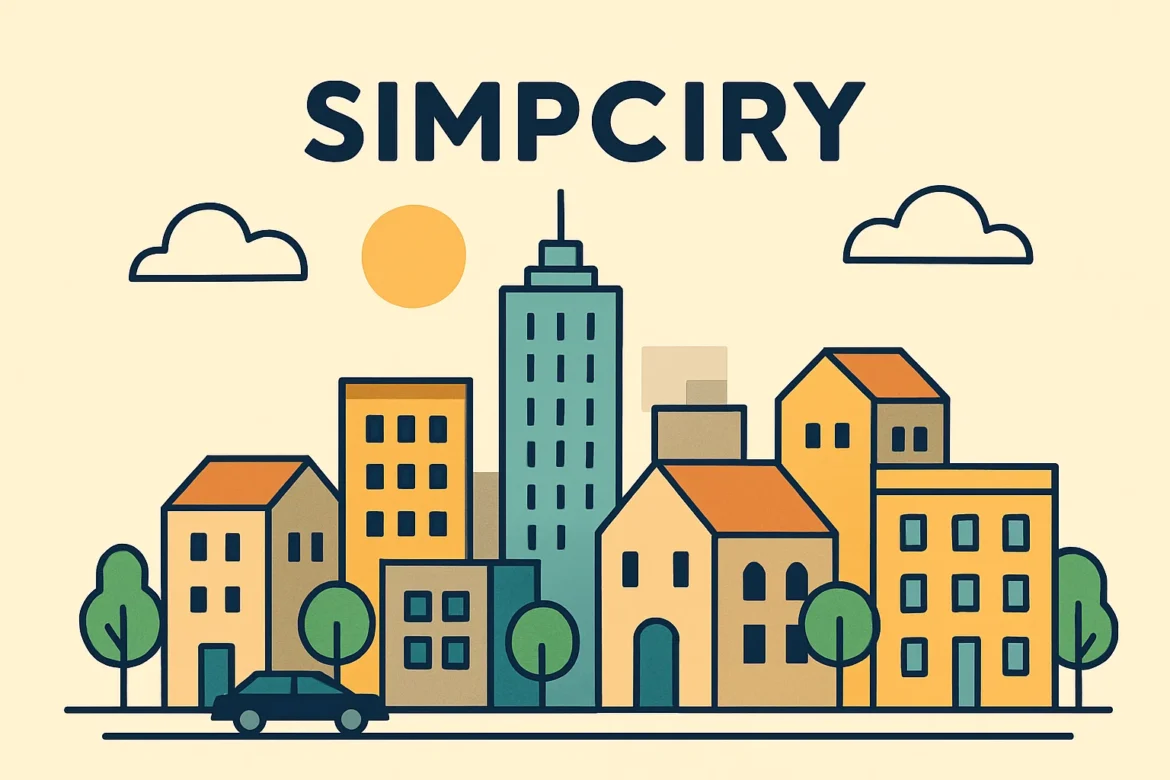
In today’s fast-paced and highly digitalized world, new terms and concepts often emerge that represent broader cultural shifts. One such term that has been gaining attention is simpciry. While at first glance it may look like a misspelling of “simplicity,” the word carries a more nuanced and layered meaning. Simpciry represents not just the act of simplifying, but the art of finding clarity, harmony, and balance in various aspects of life—whether personal, professional, or social. This article will dive deep into the idea of simpciry, why it matters, and how it can be applied in different dimensions of life for greater fulfillment and success.
The Origins and Essence of Simpciry
The term simpciry can be seen as an evolution of simplicity, but it does not only emphasize minimalism or reduction. Instead, it blends clarity of purpose with efficiency of action. The essence of simpciry lies in stripping away distractions while also ensuring that what remains is meaningful, organized, and aligned with personal or collective goals. This unique perspective makes simpciry a concept worth exploring for individuals and organizations seeking to navigate the complexities of modern life.
Simpciry in Everyday Life
On a personal level, simpciry reflects the pursuit of a lifestyle where one focuses on what truly matters. It is not just about decluttering physical possessions but also about reducing mental noise and emotional burdens. For instance, an individual practicing simpciry may choose to prioritize meaningful relationships, dedicate time to personal well-being, and avoid unnecessary stressors.
Everyday habits such as keeping a clean living space, setting boundaries with technology, or maintaining a balanced work-life routine all represent practical applications of simpciry. By focusing on essentials and removing excess, people find themselves feeling lighter, freer, and more capable of enjoying life.
Simpciry in the Digital Age
In the digital landscape, the concept of simpciry becomes even more critical. With constant notifications, overwhelming information, and a growing culture of distraction, many people struggle to maintain focus. Simpciry provides a counterbalance by encouraging mindful digital habits.
This could include practices like limiting screen time, unsubscribing from unnecessary emails, or using tools that enhance productivity instead of fragmenting attention. Simpciry in the digital world means adopting technologies thoughtfully rather than being enslaved by them. It encourages digital minimalism without losing out on the true benefits of innovation.
The Philosophy of Simpciry
Simpciry can be understood as a philosophy of living. It combines aspects of mindfulness, intentionality, and efficiency. Unlike minimalism, which often focuses heavily on reducing possessions, simpciry emphasizes clarity of thought and purpose. It asks a fundamental question: “Does this action, object, or decision add value to my life?”
By answering this question consistently, individuals and organizations can ensure that their time and energy are directed toward meaningful endeavors. This philosophy helps avoid wasted effort and creates a stronger sense of satisfaction and contentment.
Simpciry and Mental Well-being
The connection between simpciry and mental health is undeniable. Modern life is often filled with anxiety, burnout, and stress due to information overload and societal pressure. By embracing simpciry, individuals can create mental space and achieve emotional balance.
For example, practicing simpciry could mean reducing unnecessary commitments, learning to say no, or focusing on mindfulness exercises that help one stay present. Mental clarity thrives in environments where simpciry is valued because fewer distractions allow deeper reflection and healthier coping strategies.
Simpciry in Relationships
Relationships, whether personal or professional, benefit greatly from simpciry. Too often, people complicate interactions by overthinking, making assumptions, or failing to communicate openly. Simpciry in relationships means practicing honesty, directness, and respect.
By focusing on clear communication and genuine connection, individuals can build stronger bonds. Simpciry removes unnecessary drama and fosters trust, making relationships more stable and fulfilling. It also encourages people to let go of toxic dynamics and instead invest in meaningful, supportive partnerships.
Simpciry in Professional Life
 In the workplace, simpciry has a transformative effect. Many organizations struggle with inefficiency due to over-complicated systems, unnecessary bureaucracy, and unclear goals. By applying simpciry, businesses can streamline operations, clarify roles, and boost productivity.
In the workplace, simpciry has a transformative effect. Many organizations struggle with inefficiency due to over-complicated systems, unnecessary bureaucracy, and unclear goals. By applying simpciry, businesses can streamline operations, clarify roles, and boost productivity.
For employees, simpciry translates to focusing on high-value tasks rather than getting lost in constant multitasking. Leaders who embrace simpciry prioritize clarity in their communication, making it easier for teams to align and perform effectively. The result is not just greater efficiency but also improved morale and workplace satisfaction.
Simpciry in Creativity and Innovation
One of the most surprising areas where simpciry thrives is creativity. Many assume that creativity flourishes in chaos, but in reality, too much clutter—whether mental or environmental—can stifle innovation. Simpciry clears away noise and provides mental space for ideas to grow.
Artists, writers, and entrepreneurs often find that embracing simpciry helps them focus deeply on their craft. By removing unnecessary distractions, they can refine their vision and produce work that is both impactful and authentic. Innovation, after all, requires clarity of thought, and this clarity is the hallmark of simpciry.
Simpciry in Decision-Making
Decision fatigue is a common challenge in modern life. With countless choices available, people often feel paralyzed or regretful after making decisions. Simpciry provides a framework to overcome this by encouraging individuals to focus on core values and priorities.
For example, instead of analyzing every possible outcome, someone practicing simpciry will identify the options most aligned with their goals and make decisions accordingly. This approach reduces stress, speeds up the decision-making process, and leads to more consistent and fulfilling results.
Simpciry and Financial Freedom
Financial well-being is another area where simpciry has profound benefits. By adopting simpciry in financial planning, individuals can avoid unnecessary expenses, reduce debt, and build long-term stability.
This might include cutting down on impulsive purchases, focusing on saving, or investing only in areas that bring real value. Simpciry helps people understand the difference between wants and needs, ultimately leading to greater financial freedom and security.
The Role of Simpciry in Environmental Sustainability
On a global scale, simpciry plays a crucial role in environmental sustainability. Modern consumer culture often emphasizes excess, leading to waste and ecological damage. By practicing simpciry, individuals and communities can make more responsible choices.
This could mean adopting sustainable consumption habits, reducing waste, or supporting eco-friendly products. Simpciry in this sense is not about deprivation but about mindful living that respects both personal needs and the health of the planet.
Simpciry as a Path to Happiness
Ultimately, simpciry leads to greater happiness. When people focus on what truly matters, let go of excess, and embrace clarity, they often find themselves more content. Simpciry shifts the focus from external validation to internal fulfillment, helping individuals appreciate life’s simple pleasures.
Happiness does not always come from more; often, it comes from less—but with purpose. This is the true beauty of simpciry: it aligns life with meaning, creating a sense of peace and joy that excess can never provide.
Challenges in Practicing Simpciry
Despite its many benefits, simpciry is not always easy to practice. The modern world thrives on complexity, and societal pressures often push individuals toward excess. Advertising, social media, and cultural norms frequently encourage overconsumption and overstimulation.
To embrace simpciry, one must actively resist these pressures. It requires discipline, mindfulness, and a willingness to swim against the tide of mainstream culture. Yet, the challenges are worth it, as the rewards of simpciry far outweigh the initial difficulties.
Steps to Incorporate Simpciry in Daily Life
Practicing simpciry does not mean making drastic changes overnight. Instead, it can be adopted gradually through small, intentional steps. Some practical ways include:
-
Decluttering personal spaces to create a calm environment.
-
Practicing mindfulness and meditation to enhance mental clarity.
-
Limiting unnecessary commitments to focus on priorities.
-
Streamlining work tasks to reduce inefficiency.
-
Managing finances with clear goals and restraint.
-
Building meaningful relationships based on trust and respect.
These steps, while simple, lead to profound results when practiced consistently.
The Future of Simpciry
As the world grows more complex, the importance of simpciry will only continue to rise. People are increasingly seeking ways to disconnect from the chaos of modern life and find balance. Organizations too are realizing that clarity and simplicity often lead to better outcomes than complexity.
The future may see simpciry become a guiding principle not only for individuals but also for businesses, governments, and communities. Its principles can shape more sustainable, efficient, and harmonious societies.
Conclusion: Embracing Simpciry as a Way of Life
Simpciry is more than just a word—it is a lifestyle, a philosophy, and a powerful tool for navigating the challenges of modern existence. By focusing on clarity, purpose, and balance, simpciry enables individuals to live more intentionally, organizations to operate more effectively, and societies to move toward sustainability and harmony.
Embracing simpciry does not mean giving up on ambition or progress; rather, it means aligning every action with meaningful goals and cutting away what does not serve a higher purpose. In doing so, simpciry opens the door to greater fulfillment, peace, and happiness—something we all strive for in today’s fast-changing world.
Also Read: Бишкоти ди Прато


